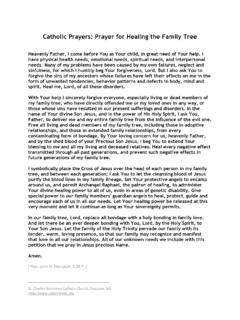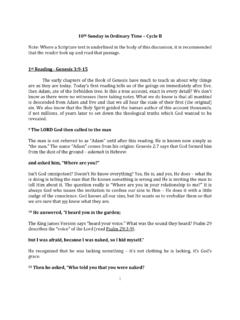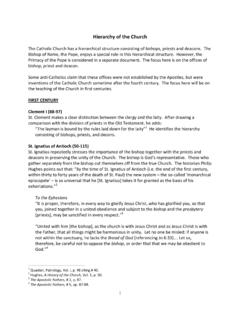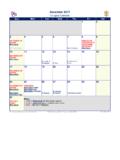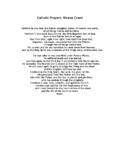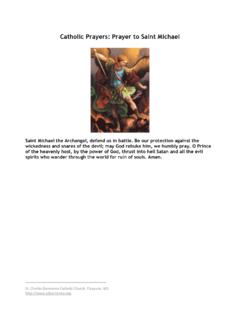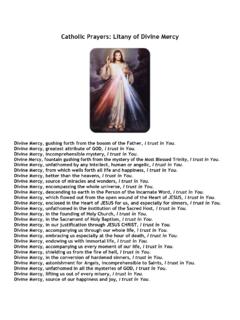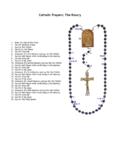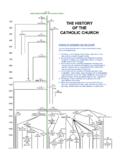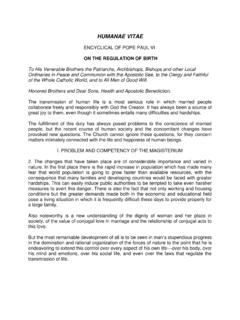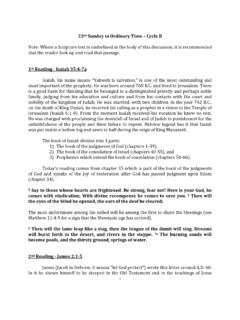Transcription of Feast of the Holy Family - Cycle B
1 Feast of the holy Family Cycle B. Note: Where a Scripture text is underlined in the body of this discussion, it is recommended that the reader look up and read that passage. Introduction The Feast of the holy Family honors the Family group of Jesus, Mary and Joseph. This Feast developed only in the 17th century. Built on the Gospel accounts, this Family is looked upon as an excellent domestic unit representing the ideal Family life. To promote Family life and build up devotion to the holy Family , a Feast was established for the Universal Church in 1921 (under Pope Benedict XV), and it is currently celebrated on the Sunday after Christmas or on December 30 when Christmas falls on Sunday. There is an optional set of readings for the 1st and 2nd Readings, both are presented here. 1st Reading - Sirach 3:2-7, 12-14. Israelite wisdom, like the wisdom of other peoples, was the product of the scribal schools and the scribal class; this class first appeared under the monarchy and followed Egyptian models in administration and procedure.
2 Wisdom is gained by counsel and instruction (Proverbs 1:5; 12:15; 13:14; 19:20f), and the young man is frequently admonished to accept instruction. Wisdom comes from association with the wise (Proverbs 13:20). The tradition of wisdom begins with primordial man (Ezekiel 28:12). The wise man accepts correction and instruction (Proverbs 9:8ff; 21:11); he is always learning, where the fool refuses to learn. Israelite wisdom was modified by its relation to faith in Yahweh, which gives it a character of its own. Both Egypt and Mesopotamia had gods who were venerated for their wisdom, but these gods were specialists. Yahweh alone is truly wise; His wisdom is exhibited in creation (Proverbs 3:19; Job 38- 39). Wisdom is a treasure which men cannot discover, for it is found only with God, who grants it to men. The wisdom of God is seen not only in His creation but in His management of human history (Job 12:13). Wisdom, while learned from tradition, is ultimately a gift of Yahweh (Proverbs 2:6).
3 The wisdom literature alone in the Old Testament directs attention explicitly to the problems of the individual person; it is free of peculiarly national traits and of messianism. Its merit is that it does draw attention to the importance of the business of daily life of the man who is not very important, and its emphasis on the fact that life is unity and integrity which must be preserved from the disintegration of folly is not misplaced. Today we hear Sirach tell us that fidelity to parents (the 4th commandment) is 1. fidelity to Yahweh. 2 For the LORD sets a father in honor over his children; a mother's authority he confirms over her sons. 3 He who honors his father atones for sins;. This goes beyond the 4th commandment which promises long life (Exodus 20:12). 4 he stores up riches who reveres his mother. 5 He who honors his father is gladdened by children, and when he prays he is heard. 6 He who reveres his father will live a long life; he obeys the LORD who brings comfort to his mother.
4 12 My son, take care of your father when he is old; grieve him not as long as he lives. 13 Even if his mind fail, be considerate of him; revile him not in the fullness of your strength. 14. For kindness to a father will not be forgotten, firmly planted against the debt of your sins -- a house raised in justice to you. This is a commentary on the 4th commandment (Exodus 20:12). Fidelity to this commandment also atones for sins. Optional 1st Reading - Genesis 15:1-6; 21:1-3. After the fall of our first parents, God announced that a savior would redeem mankind from the power of Satan. One of the first steps toward the fulfillment of this promise was God's choice of Abram (later renamed Abraham), whose faith would make him the father of a great people. God told Abram Go forth from the land of your kinsfolk and from your father's house to a land that I will show you. I will make of you a great nation, and I will bless you; I will make your name great, so that you will be a blessing.
5 I will bless those who bless you and curse those who curse you. All the communities of the earth shall find blessing in you (Genesis 12:1-3). This is a three-fold promise of blessing: 1). Nationhood; 2) Name (which is dynasty or kingdom); and 3) Worldwide blessing. Our reading of today is the actions immediately preceding the formation of a covenant with God concerning the first promise, a covenant which is fulfilled in Moses; the second promise is sealed by covenant in Genesis 17:1-19, a covenant which is fulfilled in David; and the third promise is sealed by covenant in Genesis 22, a covenant which finds fulfillment in Jesus the Christ. 15:1 Some time after these events, this word of the LORD came to Abram in a vision: Fear not, Abram! I am your shield; I will make your reward very great. 2 But Abram said, O Lord GOD, what good will your gifts be, if I keep on being childless and have as my heir the steward of my house, Eliezer?
6 It was socially and legally acceptable at the time for childless parents to appoint as their heir either an adopted son or the child of a concubine. The name Eliezer means God his help.. 2. 3 Abram continued, See, you have given me no offspring, and so one of my servants will be my heir. 4 Then the word of the LORD came to him: No, that one shall not be your heir; your own issue shall be your heir.. God rejects the possibility of adopting Eliezer in order to have an heir and instead states that Abram shall father a son. At this time Abram is about 85 years old and Sari, his wife, is no spring chicken either. 5 He took him outside and said: Look up at the sky and count the stars, if you can. Just so, he added, shall your descendants be. 6 Abram put his faith in the LORD, who credited it to him as an act of righteousness. This is not salvation by faith alone, Abram has been obedient to God since Genesis 12 when he was told to leave the home of his kinfolk.
7 Abram's obedience to his faith in God is what merits credit as an act of righteousness. In between where this verse leaves off and where we rejoin the narrative in Chapter 21, Abram sires a son through Sari's maidservant Hagar (means flight or stranger ) who is also rejected by God, thus rejecting the second possibility of creating an heir through a concubine. 21:1. The LORD took note of Sarah as he had said he would; he did for her as he had promised. At this point Abraham (Abram's and Sari's names were changed in Chapter 17) is 100 years old. 2 Sarah became pregnant and bore Abraham a son in his old age, at the set time that God had stated. 3 Abraham gave the name Isaac to this son of his whom Sarah bore him. The name Isaac means laughter. When Abraham had been told by God a year earlier that he and Sarah would be parents of a son, Sarah laughed (Genesis 18:10-15). 2nd Reading - Colossians 3:12-21. The purpose of Colossians was to bolster the faith of the community and correct errors reported about the church in Colossae.
8 False teachers are at work in the community and since these false teachers are charged with not holding to the head , the errors must have arisen within the community. Jewish and pagan elements seem to be interwoven. The Jewish influence is evident in the references to observing suggested days, season, circumcision, and other Jewish practices (Colossians 2:16-17). In some circles of Judaism there was a strong belief in the mediatorship and power of the angels. The Qumran community attached a great deal of importance to the angel's names and their roles in the affairs of the world. 3. The pagan influences at work in Colossae are reflected in beliefs that certain elements of the world or angelic beings were in control of the universe (Colossians 2:8,20). These elements of the world were a series of intermediaries between God and the universe. Each was considered to contain part of the fullness of the Godhead (Colossians 1:19; 2:9).
9 They were the cause of creation (Colossians 1:15-17). They also shared control over various areas of the earth and over the destinies of men. Paul had to counter the dangerous tendencies by pointing out the all-sufficiency of Christ in His role in the universe. He had to point out that the fullness of the Godhead was not shared by a multitude of intermediaries: all the fullness of God and His power was in Christ himself (1:19; 2:3,9). By His death on the cross, Christ had won a victory over all the forces that were considered to control the universe. In Old Testament wisdom literature Paul found proof that the whole universe had been created and directed by the wisdom of God from the beginning; now this wisdom had been fully revealed in Christ (Colossians 1:15-20). In our reading today we hear Paul tell us some of the general principles for a life in Christ. 12 Put on, as God's chosen ones, holy and beloved, heartfelt compassion, kindness, humility, gentleness, and patience, When you were baptized, you clothed yourself in Christ.
10 This is a brief description of that clothing. These terms (chosen, holy , beloved) were also used in the Old Testament to describe Israel. As a baptized Christian they have entered the new Israel, a community of God's people their relations to one another should reflect this. 13bearing with one another and forgiving one another, if one has a grievance against another; as the Lord has forgiven you, so must you also do. Forgive as you have been forgiven. The petition of the Lord's Prayer (Matthew 6:12) may be in Paul's mind (see Ephesians 4:32). 14 And over all these put on love, that is, the bond of perfection. In verse 12 Paul told us to clothe ourselves in the attributes of Christ. Now we put on love (agape) as the final garment which covers all the others and binds them together. In the Sermon on the Mount, God's great universal love is the supreme model for man Be perfect as your heavenly Father is perfect (Matthew 5:48).
